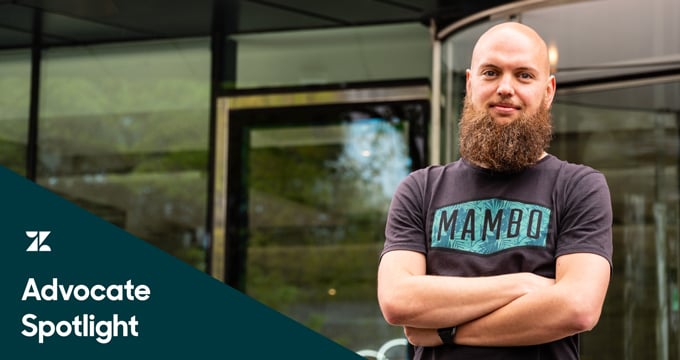Article • 4 min read
Why support advocates should never fear the banana
출처 Kayla Schmidt, Agent initiatives associate, @get_schmidty
최종 업데이트: September 8, 2020
Robin Frerichs once worked in tech support for a travel agency. In that role, he adopted a key philosophy: don’t fear the banana.
“Don’t fear the banana” refers to a psychology experiment in which several monkeys were placed in a room and subsequently punished whenever one reached for a nearby banana. As the story goes, the monkeys learned to stop trying for the banana, going so far as to pull new, uninitiated monkeys away from it.
It sums up Robin’s experience at that previous company. “The tool we were using had about 40 different fields on it,” Robin recalls. “So I asked, ‘What does that do?’ And they responded, ‘We don’t touch that.’ This went on for multiple fields and they finally said, ‘We don’t know, because we were told we shouldn’t touch it, so we just don’t touch it.’”
Though the experiment’s veracity and findings are debated among psychologists, the metaphor stands: don’t be afraid to shake up the status quo.
Robin takes that to heart at Zendesk, where he works as a Senior Support Operations Manager in the Dublin office. His team supports Zendesk’s own support agents by ensuring the product works internally the same way it does for customers, and providing them with the tools and information they need to do their jobs. It means regularly eating our own dog food—another apt metaphor—and being very honest about how it tastes.
“It really gets under my skin when you have to sift through all of this other stuff to do the job you’re actually paid to do,” Robin says. “I help make sure that people don’t have to deal with 75% bullshit and 25% actual work.”
Weeks after starting at Zendesk as a Tier 1 advocate in 2014, Robin met a support operations manager and immediately knew he wanted to join that team. He gained valuable product knowledge as a support advocate, moved on to become a support operations system specialist, and is now a senior manager on the team.
“I figured out early on that if you can shave two seconds off every ticket, and you’re solving 100 tickets every week, that gives you space for an additional ticket pretty much every day,” Robin explains. “By that math, if you’re clicking through clunky processes for the sake of the process, you’re wasting everyone’s time.”
Heaps of public praise aren’t common for those behind the scenes, tending to the back end of the product, but no news tends to be good news around here. This was the case a few months ago when Robin and his team were tasked with merging two internal Zendesk instances, something he had not done before.
“The fact that the merge went off without too much going wrong, without anyone getting inundated with tickets, or without Zendesk blowing up, was a huge win for our team,” Robin says.
Another major project was implementing new guidelines under General Data Protection Regulation (GDPR) across the Zendesk customer base. Robin and his team ensured Zendesk support advocates had macros available in every supported language, ready for any issue customers were having.
Helping a team of more than 100 support advocates help others is no easy feat. Support operations’ KPIs are therefore more complicated given their partnership with so many internal teams, as well as Zendesk end users. Communicating with different teams and project managers each week helps ensure support ops can educate advocates, ensuring they’re aware of new processes or upcoming feature releases.
Robin enjoys the challenge of constantly changing products, and he still isn’t afraid of breaking things from time to time. Plus, he finds that the unsung aspects of his job can also be the most rewarding.
“Our job is really to thread the needle between the customer experience and the advocate experience,” Robin says. “And I think our job really is to make advocates’ lives easier by providing good customer service for them.”
More first-hand career tips from Zendesk advocates:
Leah Guest used her experience as a front-line advocate to springboard into a whole new team and role.
Carl McDowell approaches every support ticket like a puzzle—learn what drives him to solve them.
Esperanza “Zsa” Trias, on how to grow in your support role
Teresa Rosado-Sanna, takes an international approach to customer support—and real life.
Abel Martin, on building great internal partnerships
Arthur Mori, on what everyone should know about Tier 1 support
Benjamin Towne, on mentoring and offering constructive criticism
Rodney Lewis, on setting up an internal shadowing program
Sarah Kay, on her move from advocate to data analyst
Ramona Lopez, on rolling out an advocate recognition program
Aurash Pourmand, on practicing customer empathy
Anna Lee Ledesma, on the skill every great chat agent needs to have
Mark Fado, on providing dedicated 1:1 client support
Justin Helley, on advocacy training and development
Guillaume Deleeuw, on problem-solving in Tier 2 technical support
